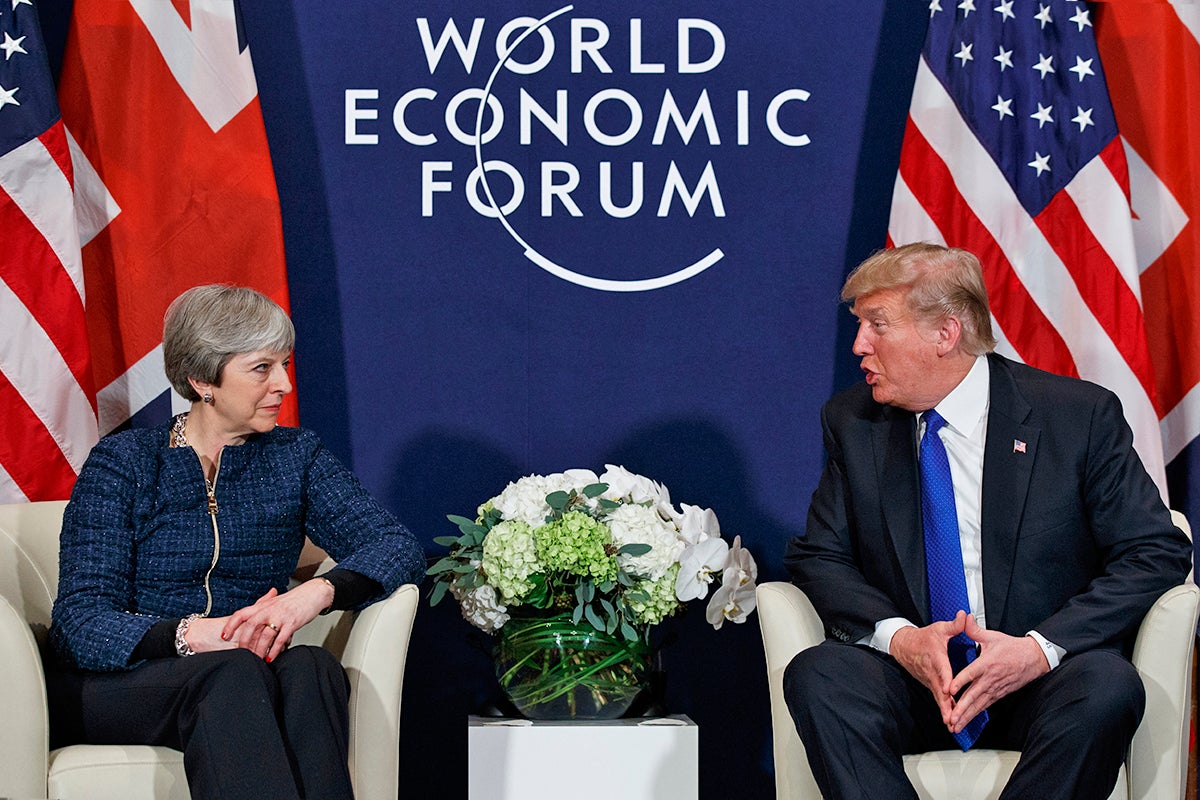Theresa May's speech at Davos is being thought of as a success merely because it wasn't a disaster
News out of the World Economic Forum is illuminating in terms of home and international politics. Not for the first time, Donald Trump has rashly promised rather more than he can deliver, even if the UK does turn out to be 'first in line' for talks

Even by her own uncomfortable standards, Theresa May’s appearance with Donald Trump in the margins of the World Economic Forum was an extraordinarily stilted affair. She did well to disguise any pain, metaphorical or physical, she felt after publicly shaking the President’s hand, and she could count herself fortunate that the formal encounter in front of the cameras passed off without a hitch. As with her speech earlier in the day, the backdrop stayed in one piece, no flags fell over, Mr Trump didn’t go postal, and she didn’t suffer a coughing fit.
She might, though, have choked on her metaphorical cornflakes had she been briefed over breakfast about the sky-high expectations for a UK-US post-Brexit trade deal that the President thrust into the Alpine air.
With his customary bravado, Mr Trump suggested a multiplication of trade between the two allies, with more jobs and a general strengthening of what Ms May was emboldened to call “the really special relationship”. (That being in stark contrast to Boris Johnson, who declines to use the expression because it “sounds needy”.)
Ms May ought to have been pleased by this display of solidarity in the face of what are still very difficult negotiations ahead with the EU. It could conceivably strengthen her bargaining hand.
The problem with Mr Trump’s remarks was that they were, literally, unbelievable. It would take decades, even under the most generous of trading partnerships, to see the kind of expansion in exports and imports that Mr Trump appeared to pledge. They would not necessarily create more jobs immediately – there would need to be an adjustment on both sides, and that reminds us of a more fundamental stumbling block for a new economic partnership: Mr Trump is a self-declared, out-and-out “America First” protectionist.
Is The Donald really up for jobs being lost from Wall Street to the City of London? For US auto workers to watch British car imports take sales away from their products? For cherished American brands and companies to be bought and sold by British-based companies?

Not for the first time, Mr Trump has rashly promised rather more than he can deliver, even if the UK does turn out to be “first in line” for talks. On this occasion, however, he has also been over-promising on the British Prime Minister’s behalf, and with so many of her hopes and aspirations about the disadvantaged or the “just about managing” remaining miserably unfulfilled, she really doesn’t need yet more false and inflated expectations placed on her shoulders. Reality will intrude tomorrow when David Davis, ever the optimistic Brexit bulldog, has a stab at outlining the UK’s objectives in phase II of the talks on the transition or implementation deal; they will be responded to by the European Commission on Monday. Davos will have seemed warm by comparison.
So the Prime Minister was probably wise not to spend too much time on Brexit in her set-piece speech to the assembled panjandrums, and to instead concentrate on less party-political matters. Her arguments about the tech giants’ new and unregulated status in the media world were well put, and timely. Although there may be suspicions that Ms May was emulating the anti-tech, anti-digital instincts of some of her powerful friends and allies in the print media, her points remained valid. As the likes of Facebook and Google might well acknowledge, what they do is entirely new in the history of the media, and the world has not yet got used to their novel functions, which are impossible to fit into the old frameworks of publishers and retailers.
Ms May was also right to repeat well-rehearsed warnings about the dangers of fake news, the spread of extremist ideologies and of trolling and abuse, particularly on social media.
That Ms May’s time in Davos was thought a success because some sort of farce didn’t envelop it is telling. The recent all-too-explicit manoeuvrings by Mr Johnson and his allies, and scraps of gossip and intrigue emanating for Westminster, suggest that Ms May’s position is probably weaker than ever. Her problems have not gone away, and Mr Trump’s promise of rescue via an ambitious UK-US trade deal may never materialise, rather like his state visit. This failure may come to haunt her, and especially if the next rounds of talks with the EU take a turn for the worse. Her Government might easily fall as a result.
To have the fate of your country’s economy, your party and your own career in the small, capricious hands of President Donald J Trump is an unenviable place to be.
Join our commenting forum
Join thought-provoking conversations, follow other Independent readers and see their replies
Comments
Bookmark popover
Removed from bookmarks